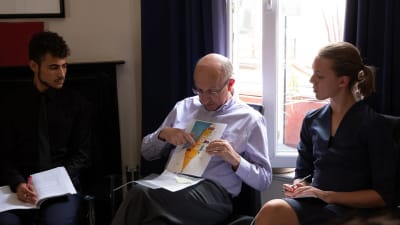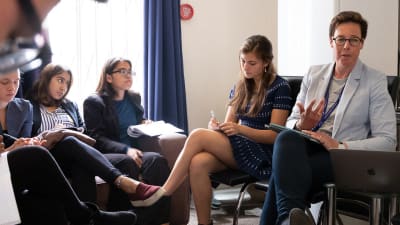The Rwandan Genocide, The European Parliament: SEGL Summer Institute, Week 3
Week 3 of the Summer Ethics and Leadership Institute was a mix of the deeply meaningful and delightfully mundane–though nothing is mundane when you are in London!
Monday began with an “only in London” experience: a lighthearted trip to Kensington Gardens (once part of the larger landscape of Hyde Park). This time, the students–with the help of Stephanie and James–were on the hunt for The Mastaba, the latest work from the artist Christo. A purple and red-hued sculpture of barrels, 65 feet high and 90 feet wide, this temporary sculpture is floating on the Serpentine Lake in Hyde Park. Students found it near Princess Diana’s memorial fountain, and after hearing some of their reactions to the piece, we set off in groups of three to enjoy the sunshine and each others’ company.
That evening, students partook in another SEGL tradition–this one more sober: an evening viewing of PBS Frontline’s documentary, Ghosts of Rwanda. Serving as a primer on the Rwandan Genocide of 1994, this film offers students another opportunity to consider some of the ethical questions they have been wrestling with the entire summer, as well as their real-world applications. Ought leaders to risk their own citizens and resources to prevent tragedy abroad, or should they always prioritize their own interests? What responsibility do colonial (or once-colonial) powers have for these tragedies?
The next day, the students had an opportunity to address some of these questions with one of the leaders featured in the documentary, longtime SEGL guest speaker Carl Wilkens. Carl Wilkens is a former Adventist missionary who was the head of his church’s relief mission in Rwanda during the genocide. He was the only American to stay behind in 1994, and is most well-known for (among other acts) saving an entire orphanage from Interahamwe machetes. To SEGL graduates, he is a winner of our coveted “Golden Mug” award, which our graduates give to the speaker who has made the biggest difference in their lives. (Carl is also an honorary SEGL teacher; he will be co-leading our third trip to Rwanda at the end of this month!). Many students found Wilkens’ message of hopefulness and action empowering after such a dark documentary. As he says in the documentary, “in each one of us, there’s such a potential for good and there’s such a potential for evil.”
On Wednesday, we traveled to SOAS University of London, where we met with Tamara Ben-Halim and Hussein Khalidi, the leaders of Makan: Palestine Reframed (Hussein happens to be the son of one of our guest speakers from earlier this semester, Dr. Ahmad Khalidi). Makan is a grassroots pro-Palestinian organization; Ben-Halim is a filmmaker and activist. They spoke on many of the Israeli-Palestinian “sticking points” our students were familiar with, and engaged our students’ pointed questions with rigor and magnanimity. (Next week, we will finish our Israeli-Palestinian conflict case studies by speaking to leaders from United Jewish Israel Appeal and the Zionist Federation of United Kingdom and Ireland, two of the UK’s most prominent pro-Israel non-profits.)
The next day, we had another opportunity to engage with the Brexit debate, arguably the top news story around the globe, up close, when we hosted European Union Member of Parliament Sebastian “Seb” Dance at our Residence. Dance, elected to the European Parliament in 2014, is a member of the Group of the Progressive Alliance of Socialists and Democrats. He was a key player in the EU’s response to the “Dieselgate” scandal, is a strong believer in the EU, and opposes Brexit. Choosing to stand at the beginning of his conversation with our students, he engaged them in a wide-reaching overview of the UK’s role in the EU, and the potential fallout from a so-called “hard Brexit.” Dance, realizing our students came prepared with well-researched questions and were ready to debate his positions, smiled and took a seat amongst them, talking through some of the finer points of his opposition to Brexit, and offering them the sort of responses one might expect from a well-read peer, not a politician. By the end, everyone had had their thinking on this issue pushed much farther than a news article, video, or traditional lecture ever could.
With that session as inspiration, students began their preparation for our Policy Memos assignment. Students will prepare policy memos on many of the most talked-about political and ethical issues in the UK – Brexit, the funding of the National Health Service, and Devolution amongst them – and part of that process will see students engaging in debates against each other on Monday. Stay tuned!












